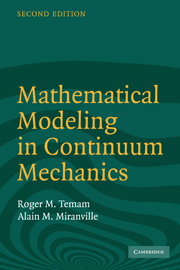Book contents
- Frontmatter
- Contents
- Preface
- A few words about notations
- PART I FUNDAMENTAL CONCEPTS IN CONTINUUM MECHANICS
- PART II PHYSICS OF FLUIDS
- PART III SOLID MECHANICS
- 13 The general equations of linear elasticity
- 14 Classical problems of elastostatics
- 15 Energy theorems, duality, and variational formulations
- 16 Introduction to nonlinear constitutive laws and to homogenization
- 17 Nonlinear elasticity and an application to biomechanics
- PART IV INTRODUCTION TO WAVE PHENOMENA
- Appendix: The partial differential equations of mechanics
- Hints for the exercises
- References
- Index
16 - Introduction to nonlinear constitutive laws and to homogenization
Published online by Cambridge University Press: 06 July 2010
- Frontmatter
- Contents
- Preface
- A few words about notations
- PART I FUNDAMENTAL CONCEPTS IN CONTINUUM MECHANICS
- PART II PHYSICS OF FLUIDS
- PART III SOLID MECHANICS
- 13 The general equations of linear elasticity
- 14 Classical problems of elastostatics
- 15 Energy theorems, duality, and variational formulations
- 16 Introduction to nonlinear constitutive laws and to homogenization
- 17 Nonlinear elasticity and an application to biomechanics
- PART IV INTRODUCTION TO WAVE PHENOMENA
- Appendix: The partial differential equations of mechanics
- Hints for the exercises
- References
- Index
Summary
Linear elasticity represents only a simplified and very particular behavior of solids. The purpose of this chapter is to present some simple examples of problems encountered when the constitutive laws are nonlinear, like some of the laws described in Chapter 5, when the stress tensor σ is a nonlinear function of the deformation tensor ε(u) in the framework of nonlinear elasticity in small displacements (see Chapter 5). As a result, the corresponding equilibrium equations are nonlinear, contrary to the equations encountered in the previous chapters in Part 3 of this book. Nonlinear mechanical phenomena are at this time a very active domain of solid mechanics in connection with the research of new materials and with the study of their mechanical properties (polymers, composite materials, etc.).
This chapter will be rather short; we only consider stationary problems and sometimes limit ourselves to problems of mechanics that involve only one space variable.
In the first three sections of this chapter, the presentation is based on energy theorems similar to those of Chapter 15 and, as indicated in Remark 15.1, we consider energy functionals w(ε) that are no longer quadratic functions of ε. In Section 16.1, in connection with nonlinear elasticity, we consider cases in which w is a strictly convex function of ε. In Section 16.2, in connection with plasticity, we consider energy functionals possessing some degeneracies: typically, w(ε) is convex but not strictly convex, which may lead to discontinuities (cracks, sliding lines).
Information
- Type
- Chapter
- Information
- Mathematical Modeling in Continuum Mechanics , pp. 248 - 258Publisher: Cambridge University PressPrint publication year: 2005
